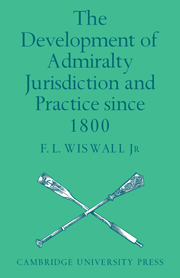Book contents
- Frontmatter
- Contents
- Preface and Acknowledgments
- List of Admiralty Judges
- Abbreviations and Symbols
- Table of Statutes
- Table of Cases
- Dedication
- INTRODUCTION
- 1 THE ERA OF STOWELL
- 2 THE COURT RESURGENT
- 3 THE FALL OF DOCTORS' COMMONS
- 4 THE GREAT TRANSITION
- 5 THE COURT UNDER COMMON LAWYERS
- 6 THE EVOLUTION OF THE ACTION in rem
- CONCLUSION
- Bibliography
- Index of Subjects
- Index of Persons
2 - THE COURT RESURGENT
Published online by Cambridge University Press: 07 October 2011
- Frontmatter
- Contents
- Preface and Acknowledgments
- List of Admiralty Judges
- Abbreviations and Symbols
- Table of Statutes
- Table of Cases
- Dedication
- INTRODUCTION
- 1 THE ERA OF STOWELL
- 2 THE COURT RESURGENT
- 3 THE FALL OF DOCTORS' COMMONS
- 4 THE GREAT TRANSITION
- 5 THE COURT UNDER COMMON LAWYERS
- 6 THE EVOLUTION OF THE ACTION in rem
- CONCLUSION
- Bibliography
- Index of Subjects
- Index of Persons
Summary
As the Admiralty Court in the era of Lord Stowell had awakened from a slumber of centuries, so it was that during the tenure of another eminent civilian, Dr Stephen Lushington, any lethargy of arousal gave way to a quick pulse of vitality.
Lushington, born in 1782, was educated at Eton and Oxford, where he attended Christ Church and became a Fellow of All Souls in 1802; he was called to the bar by the Inner Temple in 1806, and received his D.C.L. in 1808, becoming a member of Doctors' Commons in that same year. He was a Whig Member of Parliament from 1806 to 1808 and from 1820 to 1841, where his liberality in advocating the abolition of capital punishment, his opposition to the repression of Ireland and his vehemence against slavery earned for him a measure of notoriety. He succeeded Sir Christopher Robinson as Judge of the Consistory Court of London in 1828, succeeded Sir John Nicholl as Judge of the High Court of Admiralty in 1838, and became Dean of Arches and Master of the Faculties in 1858; he resigned as Admiralty Judge and Dean of Arches in 1867, but continued to hold the Mastership of the Faculties until his death in 1873.
During the judgeship of Sir John Nicholl, the 1833 Report from the Select Parliamentary Committee lay unacted upon; but Lushington was determined to secure legislation which would implement the recommendations of 1833 for a wider Admiralty jurisdiction.
- Type
- Chapter
- Information
- Publisher: Cambridge University PressPrint publication year: 1971



